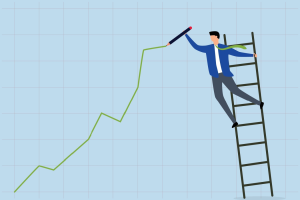Investors want to capitalize on ChatGPT’s popularity, a notable OpenAI chatbot known for its programming skills and prompt answers to complex questions. This AI glimpse has escalated the race among tech giants to create the best AI chatbot. Companies in this race form part of the best AI ETFs.
To invest in AI companies without picking specific stocks, think about an AI-focused exchange-traded fund (ETF). These ETFs grant access to various high-ranking AI companies, eliminating the need for intensive research and individual stock selection.
Here are three cost-effective ETFs offering superb diversification for passive investors.
Global Robotics & Artificial Intelligence ETF (BOTZ)
Introduced in 2016, the BOTZ Global X Robotics & Artificial Intelligence ETF (NASDAQ:BOTZ) targets firms set to benefit from rising robotics and AI use. Its scope includes industrial robotics, automation, non-industrial robots, and autonomous vehicles. Similar to other sector-tracking ETFs, this ETF selects stocks based on a specific market index.
Nvidia (NASDAQ:NVDA), a leading semiconductor designer, dominates the Global X Robotics & Artificial Intelligence ETF, contributing 11.3% to the ETF’s net asset value with its AI-powering microchips. This is a sizable increase from 7.5% in late 2022. Nvidia’s impressive price surge makes it an attractive story, and it’s logical for an AI-focused fund to invest heavily in Nvidia.
For a balanced but focused investment in the promising AI field, the Global X Robotics & Artificial Intelligence ETF is a top choice among exchange-traded funds. This makes it one of the best AI ETFs.
iShares Robotics and Artificial Intelligence ETF (IRBO)
The iShares Robotics and Artificial Intelligence ETF (NYSEARCA:IRBO) follows an index of both developed and emerging market companies. These firms are set to profit from robotics and AI’s long-term potential. Launched in 2018, IRBO manages under $1 billion in assets and has a diverse portfolio of 118 stocks. Importantly, its top holdings offer investors exposure to fast-growing small-cap firms.
Since January, the iShares Robotics and Artificial Intelligence ETF has grown significantly from roughly $25.79 to $32.15. As the AI story continues, this ETF could potentially reach $40. For a reasonable 0.47% expense ratio, IRBO provides access to top innovators in robotics and AI, including 111 other AI-related holdings. This is available at just $29.61 per share.
The fund’s prospectus shares its selection criteria for robotics and AI firms from 43 countries. To join the index, a company must have a minimum float-adjusted market capitalization of $500 million. Additionally, it should have an average daily trading volume of $2 million or more. With these factors combined this pick is one of the best AI ETFs.
ROBO Global Robotics and Automation Index ETF (THNQ)
The ROBO Global Robotics and Automation Index ETF (NYSEARCA:THNQ) follows a global index of companies spearheading groundbreaking advancements in robotics, automation, and artificial intelligence (RAAI). Robotic-assisted surgery serves as an illustrative example of the potential in the field. Intuitive Surgical, a leading company in this space, is among the top holdings in the Robo Global Robotics & Automation ETF.
The ROBO Global Artificial Intelligence ETF, a prime AI-focused ETF, includes companies leading AI technology and infrastructure like computing, data, cloud services, and AI applications in various sectors. It has a 0.75% gross expense ratio and holds 65 major AI-related companies. Its POWR Ratings reveal an overall A grade, suggesting a Strong Buy according to our rating system.
In contrast to the biotech fund, this ETF limits exposure to any single stock. Its largest holding, Harmonic Drive Systems, only accounts for about 2%. With 80 stocks, this ETF is smaller than the biotech fund, indicating the nascent stage of robotics opportunities.
On the date of publication, Chris MacDonald did not have (either directly or indirectly) any positions in the securities mentioned in this article. The opinions expressed in this article are those of the writer, subject to the InvestorPlace.com Publishing Guidelines.






